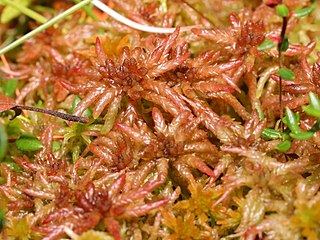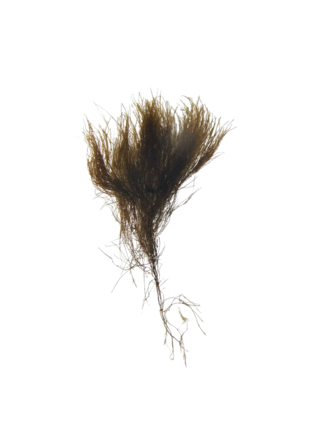
Sphagnum magellanicum, commonly called Magellanic bogmoss, Magellan's sphagnum, Magellan's peatmoss or midway peat moss, is a widespread species of moss found in wet boreal forest in the far south and southwest of South America and in northern North America and Eurasia.

Cladonia fimbriata or the trumpet cup lichen is a species cup lichen belonging to the family Cladoniaceae.

Erythrotrichia is a red algae genus in the family Erythrotrichiaceae. In Iceland, E. carnea is red listed as a vulnerable species (VU).
Tayloria acuminata, commonly known as acuminate dung moss and acuminate trumpet moss, is a bright-green dung moss species with violet radicles that age to a dark red. It is native to North America and Iceland, where it is found in bird cliffs in Hornstrandir. In Iceland it has the conservation status of a vulnerable species (VU).
Phaeosaccion is a genus of algae with monostromatic tubular to saccate thalli, up to 20 centimetres (7.9 in) long and to 2 centimetres (0.79 in) wide. It is the sole genus in the family Phaeosaccionaceae. It is olive brown and resembles young plants of Scytosiphon. The sole species in the genus is Phaeosaccion collinsii, a species of marine algae. It was first identified in a publication by W.G. Farlow in the article Notes on New England algae published in Bulletin of the Torrey Botanical Club in 1882. It was named in honor of Frank Shipley Collins. Phaeosacchion collinsii is red listed in Iceland as a vulnerable species (VU).

Prasiola crispa is a small terrestrial green alga. It has been recorded world-wide mostly from cold-temperate to polar regions.
Amblyodon dealbatus, short-tooth hump-moss, is a species of mosses belonging to the family Meesiaceae.

Atrichum undulatum is a species of mosses belonging to the family Polytrichaceae.
Bryum blindii, commonly known as Blind's bryum moss, is a species of moss belonging to the family Bryaceae.

Battersia arctica is a species of algae belonging to the family Sphacelariaceae. In Iceland, it is listed as a critically endangered species (CR).
Gyroweisia tenuis, the Slender Stubble-moss, is a species of moss belonging to the family Pottiaceae.
Neckera crispa is a species of moss belonging to the family Neckeraceae.

Stereocaulon paschale is a species of lichen belonging to the family Stereocaulaceae.
Trematodon ambiguus is a species of moss belonging to the family Bruchiaceae.

Cladonia deformis, also known as the lesser sulphur cup or the lesser sulphur cup lichen, is a light-coloured, fruticose, cup lichen belonging to the family Cladoniaceae. This lichen was first described as Lichen deformis by Carl Linnaeus in 1753, and transferred to the genus Cladonia in 1796 by Georg Franz Hoffmann.

Cladonia coniocraea, commonly known as the common powderhorn or the powderhorn cup lichen, is a species of fruticose, cup lichen in the family Cladoniaceae. It was first described by Heinrich Gustav Flörke in 1821 under the name Cenomyce coniocraea, until Kurt Polycarp Joachim Sprengel reclassified it under the genus Cladonia in 1827.

Cladonia macilenta or the lipstick cup lichen is a species of cup lichen in the family Cladoniaceae.
Cladonia homosekikaica is a species of cup lichen belonging to the family Cladoniaceae. It was formally described as a new species by Japanese lichenologist Mariko Nuno in 1975.

Atrichum tenellum, also known as the slender smoothcap, is a species of moss belonging to the family Polytrichaceae. It is red listed in Iceland as a critically endangered (CR) species. In Iceland, it is only found in two geothermal areas.
Atrichum crispum is a species of moss. It is dioicous with males being the same size as females or larger.











